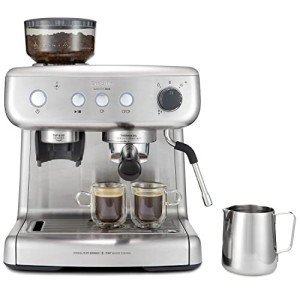Home Use Espresso Machines: A Comprehensive Guide
Espresso machines have ended up being a staple in many homes as coffee enthusiasts seek to duplicate café-quality brews in the convenience of their cooking areas. The increase in appeal has caused a varied market filled with numerous designs, functions, and prices. This post intends to offer a helpful summary of home use espresso machines, assisting readers navigate their choices successfully.
Understanding Espresso Machines
Espresso machines work by requiring hot water through finely-ground coffee under high pressure, leading to a focused coffee beverage referred to as espresso. There are numerous kinds of espresso machines classified based on their brewing methods and level of automation. The most typical types include:
- Manual Espresso Machines: These need the user to manage the pressure and water flow, permitting for a more hands-on coffee-making experience.
- Semi-Automatic Espresso Machines: These use automatic control over water pressure, while the user manually grinds and tamps the coffee.
- Automatic Espresso Machines: With the push of a button, these machines automatically control the flow of water, making it simpler to brew espresso with consistent results.
- Super-Automatic Espresso Machines: These all-in-one machines deal with grinding, tampering, brewing, and even milk frothing, making them perfect for users trying to find benefit.
- Pill or Pod Machines: These use pre-packaged coffee pods to develop espresso with very little effort, however they limit option in developing methods and flavors.
Table: Comparison of Espresso Machine Types
| Type | Control Level | Relieve of Use | Cleaning up Level | Suitable For |
|---|---|---|---|---|
| Manual | User-controlled | Moderate | High | Coffee perfectionists |
| Semi-Automatic | Partial automation | Moderate | Moderate | Home baristas |
| Automatic | Completely automated | Easy | Low | Hectic individuals |
| Super-Automatic | Totally automated | Very simple | Extremely low | Convenience applicants |
| Capsule/Pod | Completely automated | Really simple | Really low | Casual drinkers |
Key Features to Consider
When picking a home use espresso machine, it's important to think about various functions that can considerably affect the quality of espresso and user experience.
- Pressure: Look for machines that offer a minimum of 9 bars of pressure, as this is thought about optimal for brewing espresso.
- Boiler Systems: Single vs. dual boiler systems identify temperature stability and the capability to brew espresso and steam milk concurrently.
- Grinder: Integrated grinders permit newly ground coffee, which enhances taste. Consider machines with adjustable grind settings.
- Milk Frother: For those who take pleasure in cappuccinos and lattes, an integrated steam wand or automatic frother is essential.
- Size and Design: Consider your kitchen space and aesthetic choices. Machines can be found in different sizes, from compact to large setups.
- Price: Home espresso machines can range from a couple of hundred to several thousand dollars, so it's important to establish a budget before exploring options.
Pros and Cons of Home Use Espresso Machines
| Pros | Cons |
|---|---|
| Benefit of developing coffee in the house | Initial financial investment can be high |
| Quality of espresso is often superior | Needs some skill, specifically with manual machines |
| Capability to experiment with tastes | Maintenance and cleansing can be labor-intensive |
| Can conserve cash in the long run | Not all machines will match every coffee preference |
Maintenance and Cleaning Tips
Preserving an espresso machine is crucial for prolonging its life and making sure constant brew quality. Here are some helpful pointers:
- Regular Descaling: Minerals from water can develop in the machine. Descale every 1-3 months, depending upon water solidity.
- Daily Cleaning: Rinse portafilters, baskets, and steam wands after each use to prevent coffee oils from developing residue.
- Use Filtered Water: This can help in reducing mineral accumulation and enhance the taste of coffee.
- Change Gaskets and Seals: These parts might break in time and should be changed to preserve pressure and efficiency.
- Read the Manual: Each machine has particular care guidelines; following these will make sure durability.
FAQs About Home Use Espresso Machines
Q1: What is the very best budget espresso machine?The best budget espresso machine typically depends upon private needs, but models like the DeLonghi EC155 or the Breville Bambino are popular among users for supplying great worth. Buy Espresso Coffee Machines : How long do home espresso machines generally last?With correct upkeep, home espresso machines can last anywhere from 5 to 15 years, depending on the quality of the machine and frequency of use. Q3: Can I make coffees and lattes with any espresso machine?While most espresso machines can make coffees and lattes, having a dependable
steam wand or frother is necessary for achieving the best milk texture.
Q4: Are super-automatic machines worth the investment?For those who prioritize benefit and quick developing, super-automatic machines can be worth the investment, though they might do not have some customizability in brew strength and flavor. Q5: What kinds of coffee beans are best for espresso?While individual choice contributes, beans identified as" espresso "blends are typically roasted darker, developing rich tastes and a velvety texture when brewed.
Buying a home espresso machine can transform the daily coffee regimen into something special, elevating home brews to café quality. By comprehending the different types of machines, key functions to think about, upkeep requirements, and weighing the
pros and cons, customers can make educated decisions that suit their individual preferences. As the espresso culture continues to grow, no matter the option, every brew can be a delicious experience waiting to be enjoyed.

